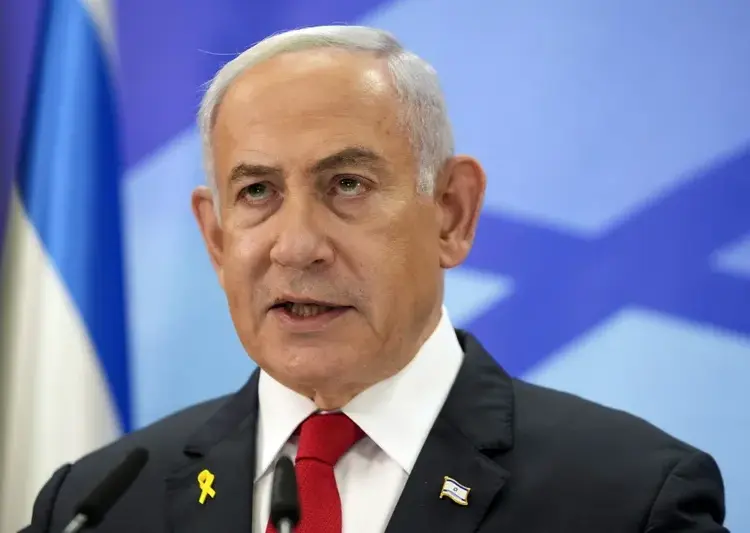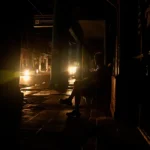
The Netanyahu war is not limited to Gaza, the occupied, Lebanon, Syrian, Yemen, Iran, and Iraq – but also to the Israeli institutions, opposition parties, and the latest internal dissent. Now the oldest politicians in the state of occupation warn of a widespread civil war.
While Israeli Prime Minister Benjamin Netanyahu claims to be leading his people to the “total victory”, with the aim of “moving the face of the Middle East,” he is actually leading the state to autocracy and feeding an internal collapse.
“We are preparing for the next stages of the war-on seven fronts,” said Israeli Premier in early March, before leaving the ceasefire in Gaza. However, he ignored the internal battlefield that graduated at home – a clear field.
At the same time to be tried by corruption, Netanyahu has been working to centralize authority, purging dissent and placing government structures under personal control. This has aggravated the tensions with the Intelligence community and the military stablishment of Israel, triggering an internal agitation that rival external war fronts.
A court blow
Prior to the launch of the Al-AQSA Flood Operation on October 7, 2023, Netanyahu’s ruling coalition pressed strongly for judicial “reforms” in order to counteract Israel’s Supreme Court. Without a formal constitution, Israel depends on the Supreme Court as a final brake against the interference of the executive. Dismantling this institution was a central objective of Netanyahu and its extreme right allies.
At the time, President Isaac Herzog already warned of the imminence of a civil war. Weekly protests burst into Tel Aviv and Jerusalem was occupied. Protesters feared a theocratic redefinition of the state that would erase their secular character.
Even Israeli and military intelligence came together with the opposition, and in March 2023, the histadrut – the main union of the state of occupation – supported a general strike. Many soldiers even refused to serve.
Although the war in Gaza temporarily set aside this internal crisis, Netanyahu quickly resumed his power outlet when public scrutiny changed, blaming intelligence chiefs for operational failures while re -establishing their purge of rivals.
Consolidated power through the crisis
Israeli judicial reforms, which divided Israeli society in half in 2023, aimed to restrict the powers of the Supreme Court. Israel has no constitution and, instead, modeled its system based on the former British mandate and the Ottoman forces that ruled Palestine.
Therefore, the Supreme Court acted for a long time as a means of preventing politicians in governors from changing the nature of the state fundamentally, acting as a force of balance for the government.
The amendments proposed by Netanyahu to this system, more precisely described as a reform of the judiciary, would allow its coalition to reread the laws, influence the way the judges of the Supreme Court are chosen and dramatically limited the powers exercised by the court to overthrow laws.
An example of this was the “reasonableness bill,” initially approved in July 2023, which sought to prevent the Supreme Court from nullifying government decisions considered “extremely irrational”.
Overall, the Israeli far -right coalition government, consisting of extremist religious parties, was seen as someone who sought to use judicial reform to inaugurate a series of laws that would make Israel a theocratic state.
Of course, many Israelis in the army, intelligence agencies, political parties, and financial elite were concerned about these fundamental changes in the nature of their country and their institutions, thus triggering a strong reaction against Netanyahu.
At the beginning of the genocidal war in Gaza, Israel had formed an emergency war government that included a series of high employees from all political currents. Shocked by the sudden defeat of the southern command of Israel and obsessed with what would come next, the issue of legal reform fell into disuse for some time.
However, revealing signs suggested that the internal crisis was not over, as Netanyahu quickly blamed the leaders of their own intelligence community by the October 7 failure, triggering internal disputes that their late apology could not contain.
In June 2024, opposition leader Benny Gantz and former military chief Gadi Eisenkot resigned to the cabinet, overthrowing the fragile unit government. This paved the way for Netanyahu to reaffirm his power agenda – initially started under the pretext of a judicial reform.
In November 2024, also the minister of fugitive defense, Yoav Gallant, who had been shocked with Netanyahu repeatedly, was forced to resign. He was replaced by Israel Katz, a longtime ally with limited experience. Meanwhile, former Rival Gideon Saar was appointed Minister of Foreign Affairs-a strategic co-optation of dissent.
Reformulating Israel’s command
In the same month, two senior advisers of Israeli Prime Minister were indicted for compromising state security by channeling confidential information directly to Netanyahu, ignoring the official channels. These revelations took place from the so -called “Bibi files” scandal – a set of harmful material suppressed for months under an order of silence imposed on Israeli media.
According to Haaretz, “Netanyahu’s intimate circle is until the neck in investigations.” The report detailed as the Prime Minister isolated himself from direct responsibility through a rigidly controlled layer of legalists, creating what the vehicle described as “an immunity zone for himself-a layer of advisors and counselors that separate him from the latest suspicions.”
With SHIN BET investigations confined to selective leaks and Israeli police effectively neutralized by the imminent shadow of the right -wing security minister Itamar Ben Gvir, Netanyahu remained untouchable. Ben Gvir had briefly resigned during the break in Gaza operations, just to reappear when the impasse between Netanyahu and Shin Bet’s boss, Ronen Bar, rekindled.
In the midst of this institutional impasse, Netanyahu delegated responsibility for the negotiations of ceasefire and prisoners with Hamas to his nearby confidant, Ron Dermer. The measure dismissed the Mossad and Israel’s Shin Bet from their traditional roles in these negotiations, effectively transforming the Prime Minister’s Office into the epicenter of all high-risk diplomatic engagement. He marked a silent blow – Netanyahu’s latest maneuver to concentrate power.
He then replaced the head of the Military Staff with Eyal Zamir, a longtime ally who previously served as his military secretary. Upon taking office, Zamir began radical changes at the Israeli army’s high command, restructuring him to better align himself with Netanyahu’s “seven fronts” war.
Shortly thereafter, Army spokesman Daniel Hagari-one of the few civil servants gaining everyone’s confidence-was fired. Hagari had conflicted with the prime minister during the war in Gaza. In November 2023, polls showed that only 4% of Israelis rely on Netanyahu, while 73.7% trusted Hagari. Despite the hostilities ongoing, the popularity of the spokesman remained stable-ultimately sealing his political destiny.
The Intelligence War
On March 21, Netanyahu tried to fire Shin Bet boss Ronen Bar, intensifying his dispute for power with national intelligence heads. The resignation – emitted amid growing scrutiny over the leakage scandal of the “Bibi files” – triggered mass protests and was temporarily blocked by the Supreme Court.
Bar, in turn, argued that his dismissal was not ordered for legitimate reasons, but the government stated that a “lack of confidence, which does not create space for a productive work environment”, was indeed reason to fire the head of intelligence.
The Israeli Attorney General, Gali Baharav-himara, later decided that the resignation of a bar was a “conflict of interest”, leading to her own resignation. In response, the president of the Israeli Bar Association, Amit Becher, demanded that Justice Minister Yariv Levin suspend the dismissal process.
The resignation of bar coincided with the resurgence of the scandal ”Qatargate,” reported for the first time by Haaretz journalist Bar Pelega. The case focused on Netanyahu’s advisers allegedly paid to conduct a pro-Qatar public relations campaign as they worked within the Prime Minister’s office-another sign of corruption corroding the core of the state.
When the Supreme Court intervened to postpone the resignation of a bar, he rekindled the anti -judicial rhetoric among Netanyahu’s far right coalition. The long campaign to counteract the Israeli judiciary returned to the agenda.
Way to authoritarianism
Netanyahu’s strategy is now clear: to purge the dissent, install loyal allies, and consolidate power through chaos. As Israeli journalist Uzi Baram states, there is a “battle for the soul of Israel.” Former Prime Minister Ehud Olmert issued an even more serious warning, predicting “Hooligans”, encouraged by Netanyahu’s rhetoric and armed by Security Minister Itamar Ben Gvir, may soon invade television studios as well as threatened the judiciary.
“Slowly and silently,” warned another former prime minister Ehud Barak, “Netanyahu is leading Israel to a point without return. The democratic collapse point will come without predicting in advance-and at a point where we can no longer stop it.”
Opposition leader and former prime minister Yair Lapid now warns of political murders within Israel. Last week, he warned threateningly:
“I now want to give a warning based on unambiguous information of intelligence: we are on my way to another disaster. This time, it will come from within. The levels of incitement and madness are unprecedented. There will be political murder here. Jews will kill Jews.”
Meanwhile, about 100,000 Israeli reservists refuse to attend the service. The general feeling of the population reflects deep discomfort – according to Maariv, 60% of Israelis now believe that civil war is a real danger.
Hundreds of Mossad veterans, army reservists and former officers signed a letter requiring a prisoners exchange with Hamas. It is one last attempt to prevent the collapse of authoritarianism. Netanyahu supporters are giving orders to fire these veterans.
While the war advances abroad, Netanyahu’s fiercest battle now happens in “home” – against the same institutions that once defined the state of occupation.
Originally published by The Cradle on April 25, 2025
Por robert inlakesh
The views expressed in this article do not necessarily reflect those of The Cradle.
Source: https://www.ocafezinho.com/2025/04/26/judeus-matarao-judeus-principais-politicos-de-israel-alertam-sobre-iminente-guerra-civil/

